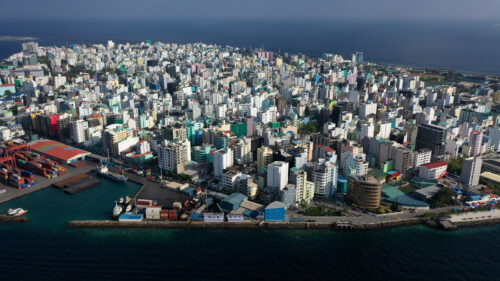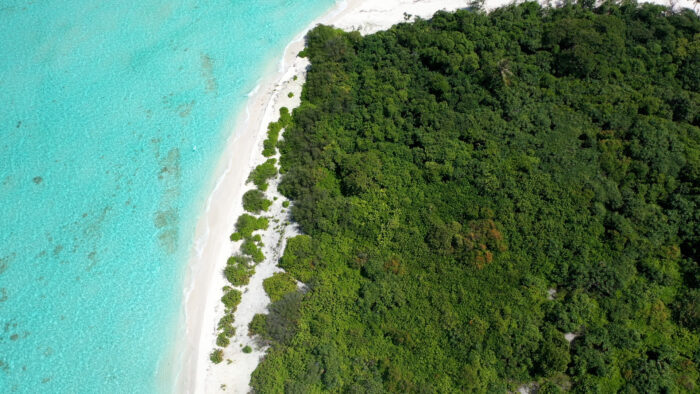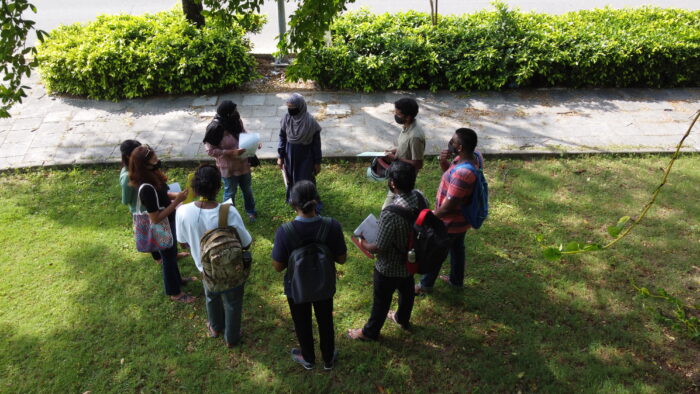From the Field: Reducing Single-Use Plastics Through Social and Behavior Change Research

The proliferation and disposal of single-use plastics threatens the health and biodiversity of our oceans and contributes to climate change. In the Maldives’ city of Hulhumalé, with an estimated population of over 240,000—roughly 41 percent of household solid waste is single-use plastics1. For the Maldives and many other island nations, the lack of space on islands and geographic distance between islands makes it very challenging to store waste and return it to the local or global circular economy—resulting in plastic leakage in the ocean, which becomes a global problem.
With global plastic production expected to double over the next two decades, it’s imperative that we reevaluate our behaviors around single-use plastics2. Improved solid waste management systems and the reduction of single-use plastics often necessitate that businesses and residents change their accustomed practices—for example, separating their waste properly or using alternative products. To be successful, policies that involve intentional behavior change require evidence about what behaviors residents and businesses are currently doing; what they are able and likely willing to do; what challenges should be addressed to better assist communities to change their behavior; and how best to promote new behaviors identified as being feasible.

USAID’s Approach
USAID Clean Cities, Blue Ocean—the Agency’s global flagship program to address ocean plastic pollution under the Save our Seas Initiative—collaborates with local partners in rapidly urbanizing cities to promote locally-relevant, feasible social and behavior change to reduce single-use plastics and their many impacts. Rather than using traditional behavior change campaigns that solely raise awareness and may achieve short-term results, USAID is promoting a longer-term, holistic approach supported by evidence and formative research to achieve sustained change and development of solid waste systems that serve the publics’ needs and abilities.
The program’s approach is grounded in qualitative research followed by Trials of Improved Practices (TIPs)—a formative research approach that tests out environmentally friendly practices in an everyday setting. In the Maldives, and other focal countries across the world, the program is partnering with local organizations to complete TIPs that inform city planners and community partners about which positive waste management behavior changes are feasible, most impactful, and how they can further be supported.
To learn more about the TIPs methodology, refer to the Clean Cities, Blue Ocean’s TIPs Research Manual or participate in USAID’s training, A New Approach for Social and Behavior Change for Solid Waste Management.
Sustainability Begins at HOME: Helping Our Marine Environment
In the Maldives, USAID’s local grantee, the Small Islands Geographic Society (SIGS), designed the Sustainability Begins at HOME (Helping Our Marine Environment) project, which used a modified TIPs approach with Hulhumalé residents to research and pilot the use of viable alternatives—identifying the greatest areas of opportunity to reduce plastic usage. The research resulted in recommendations for potential local government incentive programs and future social and behavior change strategies, in addition to reducing single-use plastics among the participating households.
First, SIGS conducted a Waste Analysis Characterization Study, a household survey with over 300 respondents, and qualitative research—which together consisted of the first research ever completed in the Maldives on household single-use plastic consumption patterns. Using the research findings, SIGS then pioneered a novel, highly innovative TIPs approach that involved 12 households using alternative products over the course of a year—to inform social and behavior change at a national scale. The households trialed the use of alternative plastic products such as reusable cloth bags, water bottles, diapers, and menstrual products; and in-home water filters. As in other TIPs, SIGS met with participant families multiple times during the study to receive their feedback and to track their journeys. SIGS also worked with the private sector to find alternatives to single-use plastics used by TIPs participants, e.g., a kitchen counter water filtration system as an alternative to bottled water.
“When I moved to Hulhumalé, I saw the amount of waste and litter and the struggle to manage it. Maybe that’s what made me so interested in this project. After all, we were quite bothered by the waste flying in the air and going along the ground. I thought about how this household could help even if what I managed to do were a very small percentage.”
Participant in SIGS’ 2021 TIPs study
Using Evidence-based Research to Change Behavior
Using evidence and formative research provides USAID and its in-country partners with concrete, actionable information to support the reduction of single-use plastics from the perspective of the residents and businesses whose behaviors are key to creating sustainable positive change and whose lives and families are most affected by that change. Longer TIPs, such as SIGS, can serve as the basis for a social and behavior change intervention in which a whole city, region, or country can be invited to participate.

SIGS found that using evidence-based research did facilitate improvements to solid waste system systems and policies. Applying TIPs findings helps to ensure that policies and regulations are geared to what people affected by them are likely to be able and willing to do and that waste systems and services support new behaviors. For example, TIPs participants in Hulhumalé liked the water filtration systems that saved them money over time compared to buying bottled water. SIGS amortized the cost of the filtration system so households made monthly, affordable payments.
“We used to spend about 600 rufiyaa ($39 USD) monthly when we bought drinking water. It’s a big relief to our budget, now. Our monthly expenses are much lower after switching to a water filter.”
Participant in SIGS’ 2021 TIPs study
“Now that we don’t use plastic bottles, we don’t have daily trash that needs taking out. It used to be that we needed to throw out 2-3 bottles daily. This household has reduced plastic, so we believe we’re helping the environment as much as we can.”
Participant in SIGS’ 2021 TIPs study
One of the main findings was that even though households supported behavior change, systemic barriers prevented them from completely changing their behavior. For example, all 12 households reported a disincentive to continue using alternative reusable bags provided by the program because plastic bags—obtained for free when buying groceries—are required for municipal waste collection and would then need to be purchased. SIGS found that replacing these bags with alternative products, such as compostable and water-soluble starch-based bags (already in use in other countries), are prohibitively expensive because they were classified as single-use plastic and therefore subject to a 400 percent import tariff3. Other barriers included a lack of information on available alternatives and the ability to access alternative products locally.
To promote their findings to a broader audience, SIGS launched a six-part docu-series that profiled the 12 Maldivian families’ journey to reduce single-use plastics. The series airs weekly on YouTube and other online platforms, showcasing research results in a compelling medium and encouraging the general public to follow along by trying the various single-use plastics themselves. A premiere event was held, which received high-level government representation from the Government of Maldives in order to scale behavior change at a national scale.
USAID continues to engage other local partners across the Clean Cities, Blue Ocean program to implement TIPs research and help local organizations and governments align solid waste management policies and plans with sustainable behaviors that residents and businesses are able and willing to practice.
To learn more about USAID’s social and behavior change work, refer to the case study or the Spring edition of Practicing Anthropology, a publication of the Society for Applied Anthropology, that features the work of Clean Cities, Blue Ocean.
12023. Small Islands Geographic Society. Final Report on Household Journey Without Plastic.
2 Chen,V, Awasthi,A K,Wei F,Tan Q and Li J (2021) Single-use plastics Production usage disposal, and adverse Impacts Science of The Total Environment 752 141772 doi101016/J scitotenv 2020141772. Chen
3 Small Islands Geographic Society. 2022. Final Report on Household Journey Without Plastic.

